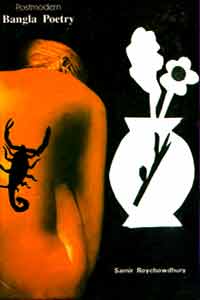 Samir Roy Choudhury was born at Panihati in West Bengal on November 1st 1933. He studied at City College, Kolkata. Here he saw his classmates Dipak Majumdar, Sunil Gangopadhyay and Ananda Bagchi who were planning to start a poetry magazine known as Krittibas (1953). He was an active member of Krittibas group. Samir became an active member of the group. Eka Ebong Koyekjan, the first collection of poems by Sunil Gangopadhyay was funded and published by Samir. When Dipak Majumdar left Krittibas group, Samir along with others were eased out of the group. He had edited the Phanishwarnath Renu issue of the magazine. Thereafter he took up a job of marine fisheries expert in a ship. His first poetry collection was known as Jharnar Pashey Shuye Aachhi that was based on his experience in the ship.
Samir Roy Choudhury was born at Panihati in West Bengal on November 1st 1933. He studied at City College, Kolkata. Here he saw his classmates Dipak Majumdar, Sunil Gangopadhyay and Ananda Bagchi who were planning to start a poetry magazine known as Krittibas (1953). He was an active member of Krittibas group. Samir became an active member of the group. Eka Ebong Koyekjan, the first collection of poems by Sunil Gangopadhyay was funded and published by Samir. When Dipak Majumdar left Krittibas group, Samir along with others were eased out of the group. He had edited the Phanishwarnath Renu issue of the magazine. Thereafter he took up a job of marine fisheries expert in a ship. His first poetry collection was known as Jharnar Pashey Shuye Aachhi that was based on his experience in the ship.
Thereafter he shifted to inland fisheries which helped him to be a part of the poorest boatmen, fishermen and fishnet-knitters families of rural India. He travelled for three decades to tribal areas like Chaibasa, Bhagalpur, Muzaffarpur, Darbhanga and so on. These places were the centres of Hungryalist poets, writers and painters. It has witnessed many creative happenings which has become a part of Bengali literary folklore. Samir had emerged as one of the original thinkers later termed as Adhunantika by the famous linguist Dr Prabal Dasgupta.
He published `Aamar Vietnam` a collection of poems that was based on the understanding of a person who lives in a different world. He often hears shocking inhuman war-news. His third collection of poems was `Janowar`. He is considered to be a master of forming words and possess flexibility in language. In the early 1990s e shifted to Kolkata started his own magazine called `Unapanchash Vayu` in Sanskrit language. He also initiated Haowa#49 Publications whose creative consultant was his brother Malay Roy Choudhury. This magazine changed the literary panorama. People who criticised the Hungry Generation movement started respecting both the brothers.
He also penned several treatises on Adhunantika aspects of Bengali society which has had an impact on arts, literature and culture. He introduced an Indianised version of unconventional genre that was known by names such as Uttaradhunika, Uttar-Adhunika, Bitadhunika, Bhashabadal, Atichetana, Adhunikottarvad and so on. Since 1990 he edited books on Post colonialism, Postmodernism, Eco feminism, Hybridity, Complexity and `The Other`. He also edited `Post modern Bengali Poetry` and `Post modern Bengali Short Stories` (2002). Bahirbanga was a new word framed by him for dispersed Bengalis.













